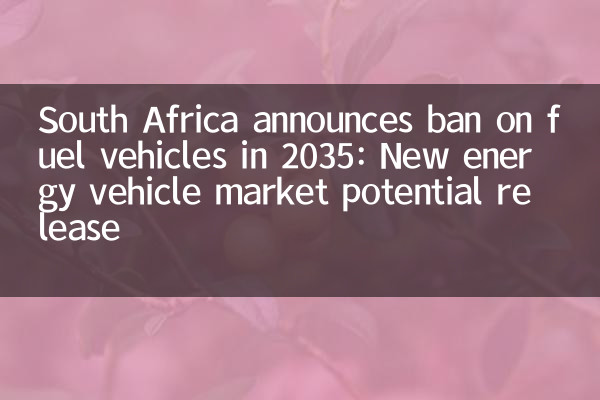South Africa announces ban on fuel vehicles in 2035: New energy vehicle market potential release
Recently, the South African government officially announced that it will completely ban the sale of fuel vehicles in 2035, which has attracted global attention to the new energy vehicle market. As one of the most economically developed countries in Africa, South Africa's move will not only promote the development of the local new energy industry chain, but also provide new market opportunities for global automakers. The following is an analysis of the hot content of the entire network on the ban on the sale of fuel vehicles and new energy vehicles in South Africa in the past 10 days.
1. Background and objectives of South Africa's policy ban on fuel vehicles

The South African government said the ban on selling fuel vehicles is to reduce carbon emissions, improve air quality, and promote the transformation of the energy structure. The country plans to achieve a share of new energy vehicles by 2035 and achieve full carbon neutrality by 2050. This policy echoes the timetable for banning fuel vehicles in many countries around the world, such as the United Kingdom and Germany, which have also formulated similar plans.
| Country/Region | Time for banned fuel vehicles | New energy vehicle target |
|---|---|---|
| South Africa | 2035 | More than 50% of the total in 2035 |
| U.K. | 2030 | Complete ban on sales in 2030 |
| Germany | 2035 | More than 50% of the total in 2030 |
| China | Not fully banned | More than 50% of the total in 2035 |
2. Analysis of the market potential of new energy vehicles
South Africa's policy of banning the sale of fuel vehicles will directly stimulate the growth of the new energy vehicle market. According to data from the International Energy Agency (IEA), global sales of new energy vehicles exceeded 10 million in 2022, while the African market accounted for less than 1%. As one of Africa's largest automobile markets, South Africa's policy adjustments will drive the demand for new energy vehicles throughout the African continent.
| area | New energy vehicle sales in 2022 | market share |
|---|---|---|
| worldwide | 10 million vehicles | 100% |
| China | 6.5 million vehicles | 65% |
| Europe | 2.5 million vehicles | 25% |
| Africa | 100,000 vehicles | 1% |
3. Global automakers are deploying in the South African market
With the introduction of South Africa's policy of banning fuel vehicles, many international car companies have begun to deploy in the South African and African markets. Tesla, BYD, Volkswagen and other brands have announced that they will establish production bases in South Africa or expand their sales network. The following is a summary of recent car companies’ dynamics:
| Car companies | Layout trends | time |
|---|---|---|
| Tesla | Plan to build a factory in South Africa | October 2023 |
| BYD | Cooperate with local South African companies to build factories | October 2023 |
| public | Expand South Africa's electric vehicle sales network | September 2023 |
4. Opportunities in South Africa's new energy vehicle industry chain
South Africa has rich mineral resources, especially platinum group metals (for hydrogen fuel cells) and lithium (for power batteries), which provides natural advantages for the development of the local new energy vehicle industry chain. In addition, the South African government also plans to attract foreign investment through tax incentives and subsidies.
The following are the key data of South Africa's new energy vehicle industry chain:
| field | Resource reserves | Global share |
|---|---|---|
| Platinum group metal | No. | 80% |
| Lithium ore | The forefront of Africa | 5% |
5. Challenges and Outlook
Although South Africa's new energy vehicle market has huge potential, it still faces challenges such as insufficient infrastructure and high electricity prices. The South African government said it will give priority to the construction of charging networks and promote renewable energy generation to support the popularization of new energy vehicles.
Overall, South Africa's policy of banning fuel vehicles in the sale of fuel vehicles marks the official start of the African new energy vehicle market. In the next 10 years, South Africa and neighboring countries will become a new battlefield for global automakers, and Chinese automakers are expected to occupy an important share in this market with their cost and technological advantages.

check the details

check the details